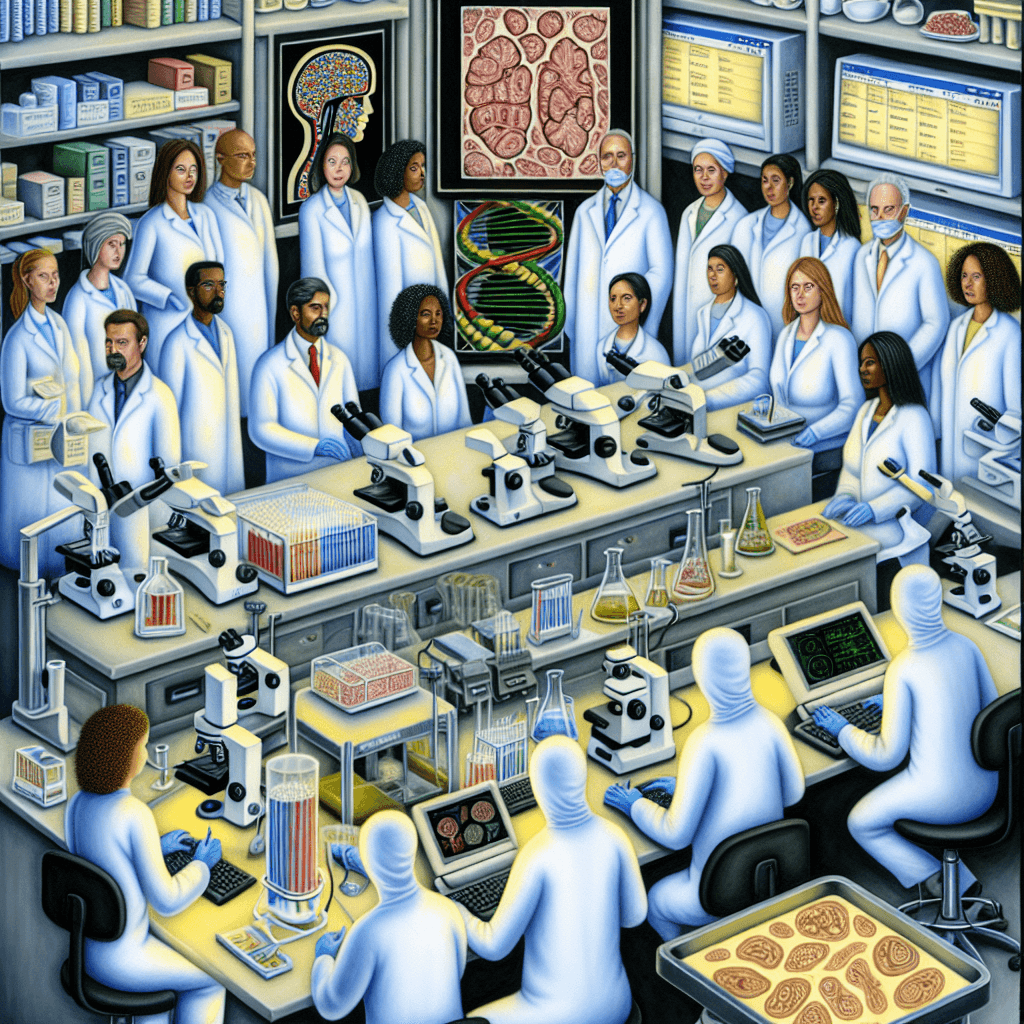Discover how biotech research is playing a crucial role in the fight against rare diseases, bringing hope to those who need it most.
The Role of Biotech Research in Fighting Rare Diseases

Table of Contents
“Empowering hope and saving lives through cutting-edge biotech research for rare diseases.”
Introduction
Biotechnology research plays a crucial role in the fight against rare diseases. These are diseases that affect a small percentage of the population and often have no known cure. Biotech research involves the use of living organisms, cells, and biological processes to develop new treatments and therapies for rare diseases. This field of research has made significant advancements in recent years, providing hope for those suffering from rare diseases and their families. In this essay, we will explore the importance of biotech research in fighting rare diseases and the impact it has on individuals and society as a whole.
The Impact of Biotech Research on Rare Disease Treatment
Rare diseases, also known as orphan diseases, are a group of disorders that affect a small percentage of the population. These diseases are often life-threatening, chronic, and have no known cure. Due to their low prevalence, they often receive little attention and funding from the medical community. However, with the advancements in biotechnology research, there is hope for those suffering from rare diseases.
Biotechnology research involves the use of living organisms or their components to develop new products and technologies for various fields, including medicine. This research has played a crucial role in understanding the underlying causes of rare diseases and developing effective treatments.
One of the significant impacts of biotech research on rare disease treatment is the development of targeted therapies. Traditional treatments for rare diseases often involve a one-size-fits-all approach, which may not be effective for all patients. Biotech research has enabled scientists to identify specific genetic mutations or biomarkers that are responsible for rare diseases. This knowledge has led to the development of targeted therapies that can address the root cause of the disease, resulting in better treatment outcomes.
Moreover, biotech research has also led to the development of gene therapies for rare diseases. Gene therapy involves replacing or repairing a faulty gene responsible for a disease with a healthy one. This approach has shown promising results in treating rare diseases such as spinal muscular atrophy and hemophilia. In some cases, gene therapy has even resulted in a complete cure for these diseases.
Another significant impact of biotech research on rare disease treatment is the development of personalized medicine. Personalized medicine involves tailoring treatments based on an individual’s genetic makeup, lifestyle, and environment. This approach has been particularly beneficial for rare diseases, as each patient may have a unique genetic mutation or biomarker causing their condition. With the help of biotech research, doctors can now identify these differences and provide personalized treatment plans for each patient, resulting in better outcomes.
Furthermore, biotech research has also played a crucial role in improving the diagnosis of rare diseases. Due to their low prevalence, rare diseases are often misdiagnosed or undiagnosed, leading to delayed or ineffective treatment. Biotech research has enabled the development of advanced diagnostic tools, such as genetic testing and biomarker analysis, which can accurately identify rare diseases. This has not only improved patient outcomes but also reduced the burden on the healthcare system by avoiding unnecessary treatments and procedures.
In addition to developing new treatments and diagnostic tools, biotech research has also contributed to the repurposing of existing drugs for rare diseases. Drug repurposing involves finding new uses for existing drugs that have already been approved for other conditions. This approach has been particularly useful for rare diseases, as it allows for faster and more cost-effective treatment options. Biotech research has enabled scientists to identify potential drug candidates for rare diseases by studying their mechanisms of action and identifying commonalities with other diseases.
Moreover, biotech research has also played a crucial role in raising awareness and advocacy for rare diseases. With the help of advanced technologies and social media, patients and their families can now connect with each other and share their experiences. This has led to the formation of patient advocacy groups, which have been instrumental in raising funds for research and lobbying for policies that support rare disease patients.
In conclusion, biotech research has had a significant impact on rare disease treatment. From developing targeted therapies and gene therapies to improving diagnosis and repurposing existing drugs, biotech research has provided hope for those suffering from rare diseases. With continued advancements in this field, we can hope for more effective treatments and, ultimately, a cure for these debilitating conditions.
Advancements in Biotech Research for Rare Disease Diagnosis

Rare diseases, also known as orphan diseases, are a group of disorders that affect a small percentage of the population. These diseases are often life-threatening and have no known cure. Due to their rarity, they often receive little attention from the medical community, resulting in delayed or misdiagnosis, limited treatment options, and a lack of research and development efforts. However, with the advancements in biotech research, there is hope for those suffering from rare diseases.
One of the major challenges in diagnosing rare diseases is the lack of awareness and knowledge among healthcare professionals. Many of these diseases have similar symptoms to more common illnesses, making it difficult to identify them. This is where biotech research plays a crucial role. With the use of advanced technologies such as next-generation sequencing and gene editing, researchers are able to identify and understand the genetic basis of rare diseases. This has led to the development of diagnostic tests that can accurately detect these diseases, even in their early stages.
In addition to improving diagnosis, biotech research has also led to the development of targeted therapies for rare diseases. Traditional treatments for rare diseases often involve a one-size-fits-all approach, which may not be effective for all patients. With the help of biotech research, personalized medicines can be developed that target the specific genetic mutations responsible for the disease. This not only improves the effectiveness of treatment but also reduces the risk of adverse reactions.
Furthermore, biotech research has also paved the way for gene therapy, a promising treatment option for rare diseases. This approach involves replacing or repairing the faulty genes responsible for the disease. In some cases, this can be achieved by delivering a healthy copy of the gene to the affected cells. In other cases, gene editing techniques such as CRISPR-Cas9 can be used to correct the genetic mutation. While still in its early stages, gene therapy has shown promising results in treating rare diseases such as spinal muscular atrophy and hemophilia.
Another area where biotech research has made significant advancements is in the development of orphan drugs. These are medications specifically designed to treat rare diseases. Due to the small market size, pharmaceutical companies were previously hesitant to invest in the development of these drugs. However, with the help of biotech research, the process of drug discovery and development has become more efficient and cost-effective. This has encouraged more companies to invest in the development of orphan drugs, providing hope for patients with rare diseases.
Moreover, biotech research has also played a crucial role in improving the quality of life for those living with rare diseases. With the use of biotechnology, researchers are able to develop therapies that not only treat the symptoms of the disease but also address the underlying cause. This has led to a significant improvement in the overall health and well-being of patients, allowing them to lead more fulfilling lives.
In conclusion, biotech research has revolutionized the way we diagnose and treat rare diseases. With the use of advanced technologies and techniques, researchers are able to identify and understand the genetic basis of these diseases, leading to more accurate diagnosis and targeted therapies. Furthermore, biotech research has also paved the way for the development of orphan drugs and gene therapy, providing hope for those suffering from rare diseases. As we continue to make advancements in biotech research, we can look forward to a future where rare diseases are no longer considered incurable.
Collaboration and Funding in Biotech Research for Rare Diseases
Biotechnology, or the use of living organisms and their systems to develop products and technologies, has revolutionized the field of medicine. With its ability to manipulate and understand the complex processes of living organisms, biotechnology has opened up new possibilities for treating diseases that were once considered incurable. One area where biotechnology has made significant strides is in the research and treatment of rare diseases.
Rare diseases, also known as orphan diseases, are defined as conditions that affect a small percentage of the population. In the United States, a disease is considered rare if it affects fewer than 200,000 people. While each rare disease may only affect a small number of individuals, collectively, they affect millions of people worldwide. According to the National Institutes of Health (NIH), there are over 7,000 rare diseases, and approximately 95% of them have no FDA-approved treatment.
The rarity of these diseases presents unique challenges for researchers and pharmaceutical companies. Due to the small number of patients, it is often difficult to conduct clinical trials and gather enough data to develop effective treatments. Additionally, the high cost of research and development for rare diseases makes it less attractive for pharmaceutical companies to invest in these areas. This is where collaboration and funding play a crucial role in biotech research for rare diseases.
Collaboration between different stakeholders, including researchers, pharmaceutical companies, patient advocacy groups, and government agencies, is essential for advancing research and finding treatments for rare diseases. One example of successful collaboration is the Rare Diseases Clinical Research Network (RDCRN), a program funded by the NIH that brings together researchers, patient advocacy groups, and healthcare professionals to study and develop treatments for rare diseases. Through this network, researchers can share resources, data, and expertise, which can accelerate the development of treatments for rare diseases.
Another important aspect of collaboration in biotech research for rare diseases is the involvement of patient advocacy groups. These groups play a crucial role in raising awareness about rare diseases, providing support to patients and their families, and advocating for research and funding. Patient advocacy groups also play a significant role in connecting researchers with patients, which is crucial for conducting clinical trials and gathering data.
Funding is another critical factor in biotech research for rare diseases. As mentioned earlier, the high cost of research and development for rare diseases makes it challenging for pharmaceutical companies to invest in these areas. Therefore, government funding and grants play a crucial role in supporting research for rare diseases. In the United States, the Orphan Products Grants Program, established by the FDA, provides funding for clinical research and drug development for rare diseases. Additionally, the Orphan Drug Act, passed in 1983, provides incentives for pharmaceutical companies to develop treatments for rare diseases, such as tax credits and market exclusivity.
In recent years, there has also been an increase in private funding for rare disease research. Non-profit organizations, such as the National Organization for Rare Disorders (NORD), have been instrumental in raising funds for research and providing grants to researchers. Additionally, venture capital firms have also shown interest in investing in biotech companies that focus on rare diseases, recognizing the potential for significant returns on investment.
In conclusion, collaboration and funding are crucial for advancing biotech research for rare diseases. The rarity of these diseases presents unique challenges, but through collaboration and funding, researchers can overcome these obstacles and develop effective treatments. With the continued support of government agencies, patient advocacy groups, and private funding, we can hope to see more breakthroughs in the treatment of rare diseases in the future.
The Future of Biotech Research in Finding Cures for Rare Diseases
The field of biotechnology has made significant advancements in the past few decades, leading to breakthroughs in the treatment of various diseases. However, there are still many rare diseases that have no known cure or treatment. These diseases, also known as orphan diseases, affect a small percentage of the population and often go unnoticed due to the lack of research and funding. But with the growing interest in biotech research, there is hope for finding cures for these rare diseases in the near future.
One of the main challenges in finding cures for rare diseases is the limited understanding of their underlying causes. Unlike common diseases, rare diseases are often caused by genetic mutations or abnormalities, making them difficult to diagnose and treat. This is where biotech research plays a crucial role. By studying the genetic makeup of individuals with rare diseases, researchers can identify the specific gene or mutation responsible for the disease. This information can then be used to develop targeted treatments that address the root cause of the disease.
Another important aspect of biotech research in finding cures for rare diseases is the use of advanced technologies. With the advent of gene editing techniques such as CRISPR-Cas9, scientists can now make precise changes to the DNA sequence, correcting genetic mutations that cause rare diseases. This has opened up new possibilities for developing personalized treatments for individuals with rare diseases, as each person’s genetic makeup is unique.
In addition to gene editing, biotech research has also made significant progress in the field of gene therapy. This approach involves introducing healthy genes into the body to replace the faulty ones, thereby correcting the underlying cause of the disease. While gene therapy has been successful in treating some rare diseases, there are still challenges to overcome, such as delivering the gene to the correct cells and ensuring its long-term effectiveness. However, with ongoing research and advancements in gene therapy techniques, it holds great promise for treating rare diseases in the future.
Apart from developing treatments, biotech research also plays a crucial role in the early detection and diagnosis of rare diseases. With the use of advanced genetic testing, doctors can now identify rare diseases in their early stages, allowing for timely intervention and treatment. This is especially important for diseases that have no visible symptoms until they have progressed to an advanced stage. Early detection can significantly improve the chances of successful treatment and improve the quality of life for individuals with rare diseases.
Moreover, biotech research has also led to the development of orphan drugs, which are medications specifically designed to treat rare diseases. These drugs often receive special incentives and funding from governments and pharmaceutical companies, as they cater to a small market. With the increasing focus on rare diseases, there has been a rise in the development of orphan drugs, providing hope for individuals with rare diseases who previously had no treatment options.
In conclusion, the future of biotech research looks promising in the fight against rare diseases. With the use of advanced technologies and a better understanding of the genetic basis of these diseases, researchers are making significant progress in developing targeted treatments and personalized therapies. Early detection and diagnosis, along with the development of orphan drugs, are also crucial in improving the lives of individuals with rare diseases. As biotech research continues to advance, there is hope that one day, we will find cures for all rare diseases, providing a better quality of life for those affected by them.
Q&A
1. What is biotech research?
Biotech research is the use of biological processes, organisms, or systems to develop new technologies and products for various industries, including medicine, agriculture, and environmental science.
2. How does biotech research help in fighting rare diseases?
Biotech research plays a crucial role in fighting rare diseases by developing new treatments, therapies, and diagnostic tools. It also helps in understanding the underlying causes of these diseases and identifying potential cures.
3. What are some examples of biotech research being used to combat rare diseases?
Some examples of biotech research being used to combat rare diseases include gene therapy, stem cell therapy, and precision medicine. These approaches use advanced biotechnology techniques to target and treat specific genetic mutations or diseases.
4. What are the challenges faced by biotech researchers in fighting rare diseases?
One of the main challenges faced by biotech researchers in fighting rare diseases is the limited understanding of these diseases and their underlying mechanisms. This makes it difficult to develop effective treatments and therapies. Additionally, the high cost and complexity of biotech research can also be a barrier in developing treatments for rare diseases.
Conclusion
In conclusion, biotech research plays a crucial role in fighting rare diseases. Through advancements in technology and scientific knowledge, biotech research has led to the development of innovative treatments and cures for rare diseases that were once considered incurable. This has not only improved the quality of life for individuals living with rare diseases, but also provided hope for their families and communities. Additionally, biotech research has also helped in early detection and prevention of rare diseases, leading to better outcomes and reduced healthcare costs. As we continue to invest in biotech research, we can expect to see even more progress in the fight against rare diseases and ultimately, a healthier and more equitable world for all.








